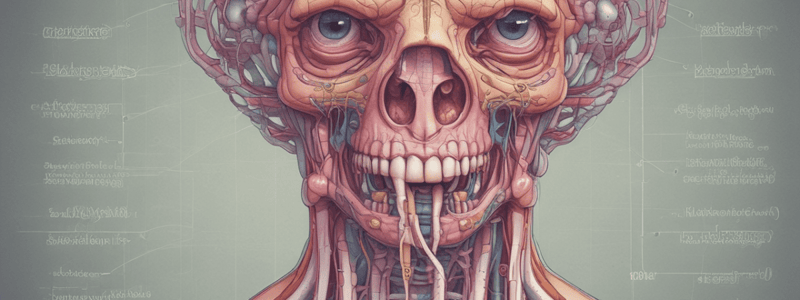Podcast
Questions and Answers
What is the primary function of saliva produced by exocrine glands in the mouth?
What is the primary function of saliva produced by exocrine glands in the mouth?
- Only digestive function
- Digestive, lubricating, and protective functions (correct)
- Only lubricating function
- Only protective function
What type of cells are present in mucous acini?
What type of cells are present in mucous acini?
- Columnar cells (correct)
- Cuboidal cells
- Squamous cells
- Pyramidal cells
What do serous acini primarily produce?
What do serous acini primarily produce?
- Mucous proteins
- Mixed proteins
- Serous proteins (correct)
- Lubricating proteins
What is the composition of mixed acini?
What is the composition of mixed acini?
What is the function of the duct portion of the major salivary gland?
What is the function of the duct portion of the major salivary gland?
What are the three types of secretory units in the salivary gland?
What are the three types of secretory units in the salivary gland?
What is the shape of the cells in mucous acini?
What is the shape of the cells in mucous acini?
What is unique about the cytoplasm of mucous acini?
What is unique about the cytoplasm of mucous acini?
What type of epithelium lines the intercalated ducts of salivary glands?
What type of epithelium lines the intercalated ducts of salivary glands?
What is the outermost layer of the gastrointestinal tract?
What is the outermost layer of the gastrointestinal tract?
What is the function of the muscularis mucosae?
What is the function of the muscularis mucosae?
In which parts of the gastrointestinal tract are glands found in the submucosa?
In which parts of the gastrointestinal tract are glands found in the submucosa?
What is the orientation of fibers in the inner layer of the esophagus?
What is the orientation of fibers in the inner layer of the esophagus?
What is the function of the esophageal glands in the submucosa?
What is the function of the esophageal glands in the submucosa?
What type of muscle fibers predominate in the upper third of the esophagus?
What type of muscle fibers predominate in the upper third of the esophagus?
What type of epithelial lining does the esophageal mucosa have?
What type of epithelial lining does the esophageal mucosa have?
What nervous system is responsible for the innervation of the alimentary canal?
What nervous system is responsible for the innervation of the alimentary canal?
What type of muscle fibers are present in the lower third of the esophagus?
What type of muscle fibers are present in the lower third of the esophagus?
What covers the short segment of the esophagus below the diaphragm?
What covers the short segment of the esophagus below the diaphragm?
Flashcards are hidden until you start studying
Study Notes
Esophagus
- A muscular tube that transports swallowed material from the pharynx to the stomach
- Mucosa has non-keratinized stratified squamous epithelial lining
- Submucosa contains small mucus-secreting glands (esophageal glands) that lubricate and protect the mucosa
- Muscularis externa composed of inner circular and outer longitudinal layers of muscle fibers
- Upper third: bundles of skeletal muscle predominate
- Middle third: combination of striated and smooth muscle fibers
- Lower third: entirely composed of smooth muscle
- Adventitia: loose connective tissue
- Serosa covers short segment below the diaphragm
Salivary Glands
- Exocrine glands in the mouth that produce saliva for digestive, lubricating, and protective functions
- Major salivary glands: Parotid, Submandibular, and Sublingual glands
- Secretory portion: units formed from cells that secrete saliva
- 3 types of secretory units (acini):
- Serous acini: pyramidal cells with round nuclei and highly stained cytoplasm
- Mucous acini: columnar cells with flattened, basally located nuclei and lightly stained cytoplasm
- Mixed acini (seromucous): composed of mucous cells capped by a few serous cells as serous demilunes
- Ducts of salivary glands:
- Intercalated ducts: lined by simple cuboidal epithelium
- Striated ducts: lined by simple columnar epithelium with thin longitudinal lines (striations)
- Interlobular ducts: possessing a stratified cuboidal or stratified columnar epithelium
General Structure of the Digestive Tract
- Hollow tube with a lumen of variable diameter and a wall made up of four main layers: mucosa, submucosa, muscularis, and serosa
- Mucosa: composed of lining epithelium, loose cellular connective tissue (lamina propria), and muscularis mucosae (outer muscular layer)
- Submucosa: contains a dense connective tissue and houses glands (only in esophagus and duodenum)
- Muscularis externa: composed of smooth muscle cells organized as two or more layers
Studying That Suits You
Use AI to generate personalized quizzes and flashcards to suit your learning preferences.



